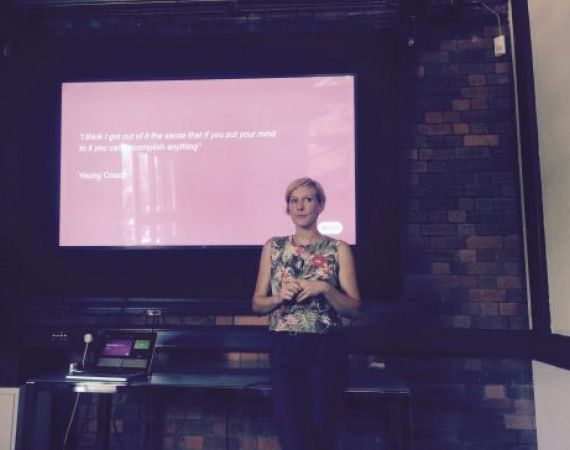Lunchtime talk write-up
Posted on Fri 10 Jul 2015
Are the kids alright? Collaborative design with children in Play Sandbox
REACT Managing Producer, Jo Lansdowne and Professor of Human Computer Interaction at the University of Bath, Danaë Stanton Fraser joined us on Friday 10 July to talk about Play Sandbox and collaborative design with children.

Jo Lansdowne
Speaker
REACT Managing Producer, Jo Lansdowne and Professor of Human Computer Interaction at the University of Bath, Danaë Stanton Fraser joined us on Friday 10 July to talk about Play Sandbox and collaborative design with children. To give a quick bit of context, REACT is an AHRC funded project led by the University of the West of England in collaboration with Watershed and the Universities of Bath, Bristol, Cardiff & Exeter. REACT funds collaborations between academics and creative companies to go through a rapid research and development process to design a product or service around a theme. The most recent Sandbox, discussed by Jo and Danaë, was themed around play, to design new products and services for children.
You can watch the six Play Sandbox project videos here.
Here are five things I learned about collaborating with children in a design process:
1. Only 5% of organisations incorporate children’s views into design (Just Kid Inc, 2002), and mostly the involvement is at the end of the process as play testers, rather than being baked into the design and development process from early on. Jo and Danaë identified that the outcome of this is that technology products marketed at children are often not tailored for the correct purpose or context.
2. REACT identified a need for children to be involved early on in the design process, and recruited a group of 14 Young Coaches (aged 8-12). The Young Coaches assisted in the selection of 6 projects, and attended workshops at the Pervasive Media Studio to work with the project teams over four months of rapid research and development.
3. REACT commissioned two external academics to research the process; Alison Oldfield and Helen Manchester from the University of Bristol. They found the impact of the Young Coaches overwhelmingly positive, and it challenged the Sandbox process itself. The design teams were constantly reminded who they were designing for.
4. Some of Young Coaches described their role as helping the adults. They talked about gaining confidence as well as knowledge of product design. The Young Coaches developed bonds very quickly with each other and the adults, and became very comfortable working in teams.
5. REACT hope that the process will encourage other companies to invite children to be co-designers. Jo observed that children are comfortable with choice, change and complexity of projects. The Young Coaches were keen to understand the process and very engaged in contributing to the projects.
Alison Oldfield and Helen Manchester will be publishing a report on their findings on the REACT website in August 2015.
